
Some vinyl flooring brands we carry.
Vinyl Flooring
(That looks too good to be vinyl)
(You may also be interested in: Linoleum Flooring)What is vinyl flooring?
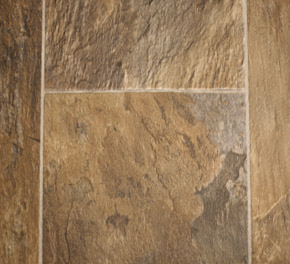
A close-up of a vinyl floor. Today's vinyl floors look so real!
There is so much available in vinyl flooring, and the detail and realism is so much more realistic than years ago. Patterns include ceramic tile, stone, wood, and more.
Vinyl come in two main types.
Sheet Vinyl on Rolls
Sheet vinyl comes on a roll like carpet. We cut off enough vinyl to do your room, and most rooms are done in one piece. Sheet vinyl has fewer seams, so liquid spills are less likely to soak through cracks into the sub-floor. You can learn more about sheet vinyl floors here.Vinyl Tile & Vinyl Planks
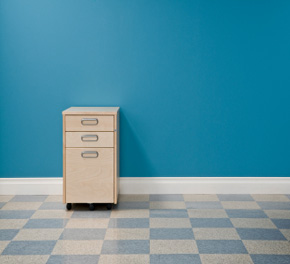
VCT or vinyl tile used in an office setting.
Plank flooring is easy to repair if you have extra flooring left over. A damaged tile can be removed and replaced without the need to replace the entire floor.
How Much Does Vinyl Flooring Cost?
Prices start at just $4.99 per sq. ft. including installation (65 sq. ft. minimum). Our most popular patterns are $5 to $9 per sq. ft including installation. And some premium vinyl floors can cost up to $12 per sq. ft. Our selection and price ranges can change at any time. Additional floor preparation may be necessary and is not included in these prices. We can determine if this is necessary when we visit your home.Vinyl Flooring that looks like Stone
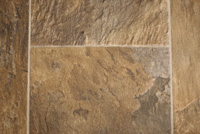
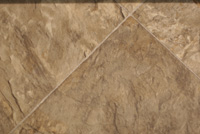
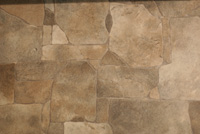
Vinyl Flooring that looks like Wood
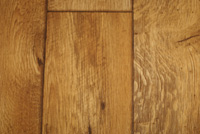
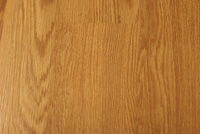

Vinyl Flooring that looks like Tile
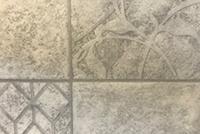
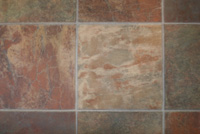
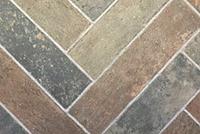
We have hundreds more colors and patterns available!
How Do I get a vinyl floor that looks this nice?
To get a floor that looks this nice, just visit us today. Call, text, or click to schedule free shop-at-home service.Common questions
Can I install vinyl flooring myself?
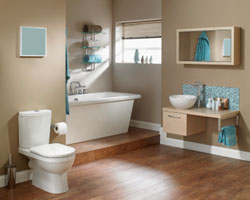
That's not wood? No. It's a vinyl floor that looks like wood!
Ironically, a manufacturer web-site suggests that vinyl floors are the easiest floor coverings to install. We believe that is wishful thinking from someone who regularly installs vinyl floors, so yes, it is easy ... for them. But the average do-it-yourselfer will be frustrated and disappointed with the results.
Do vinyl floors need to be waxed
Almost all vinyl floors today use NO wax. There are cleaners for vinyl floors that will also restore luster, which we have available for sale.Commercial VCT does require an occasional polishing, although very high end VCT might require no polishing or only one coat of polish when first installed.
Vinyl flooring is the best flooring for a basement, right?
Maybe. This is a common misconception. Concrete seems like a solid material, but it is actually quite porous. Water VAPOR (not necessarily liquid water) travels easily through concrete.When a porous floor covering is used (like carpet), the water vapor goes through the floor covering and dissipates into the air above. But when we cover the concrete with non-porous flooring like vinyl or rubber, the water vapor becomes trapped. This can develop into tremendous pressure underneath the floor. This can compromise the adhesive causing separation from the concrete.
The water vapor can also liquefy, creating an environment that is conducive to mold growth.
If your vapor emission is low enough, you may be able to use a standard vinyl. There are also floating vinyl floors that can be used in basements (yes, we have them). Floating floors are generally thick and heavy. Weight keeps them down, and they are not glued to the concrete. Even these floors have limits on how much water vapor can seep through the floor in each 24 hours period. We will test your concrete first to determine if you can safely use a vinyl floor or not. An amateur will say "you won't have any problems" because they are untrained. A professional will test your floor, and help you avoid future problems.
And what if you can't use vinyl in your basement? Then we can show you other options that may be more appropriate for your needs.
Can I install a vinyl over ceramic tile?
It depends. Tile has grout lines. When you put a sheet vinyl floor over this, those grout lines will eventually telegraph through.Someone may suggest using leveling compound to smooth out the grout lines. In theory, this is possible. However, our experience is it takes so many applications of floor leveler and labor to completely remove the indentations that we are better off removing the original floor and laying a suitable underlayment for your vinyl floor first. Then we know you won't have problems.
However, rigid core vinyl SPC and WPC) can go over somewhat uneven floors as their stiff construction keeps them from conforming to the grout lines.
Can I install a vinyl over another vinyl floor?
Maybe. The original floor must be completely glued (not loose and not glued on just the edges). And the flooring must be solidly adhered to the floor beneath it. If we glue a new vinyl to a loose vinyl, we will end up with loose vinyl. So we need it to be solidly adhered.The original vinyl may have some slight texture, and this could telegraph through the new vinyl (but not rigid core vinyl). Therefore, we'll use a leveling compound to smooth the existing floor before laying the new floor. This is not like ceramic tile, though, since the texture a vinyl floor may have is minimal compared to the deeper grout lines that ceramic tile has.
Can you pull up my existing vinyl or linoleum floor?
We can if the floor does not contain asbestos. Prior to 1990, some resilient floors contained asbestos. If your floor does not contain asbestos, we can pull it up. Who can remove my floor if it does contain asbestos? We are not providing legal advice (it is up to you ascertain the law in your situation) and the laws could change after we post this information, but it is our understanding that in Massachusetts asbestos floors can be removed by:- A licensed asbestos mitigation professional.
- The homeowner may remove asbestos, providing they make proper filings, follow all laws, thoroughly wet and double bag the material, can not make any compensation to voluntary helpers, etc., etc. The fines for failure to comply can be severe. And the state's DEP highly recommends the homeowner uses a professional.
I have an asbestos floor and can not afford to have a licensed professional remove it. What can I do?
You can go over the existing floor. It is illegal for unlicensed professionals to move or remove asbestos containing materials. But it is perfectly legal and safe to cover an asbestos floor.Reference files: How to care for your vinyl floor.